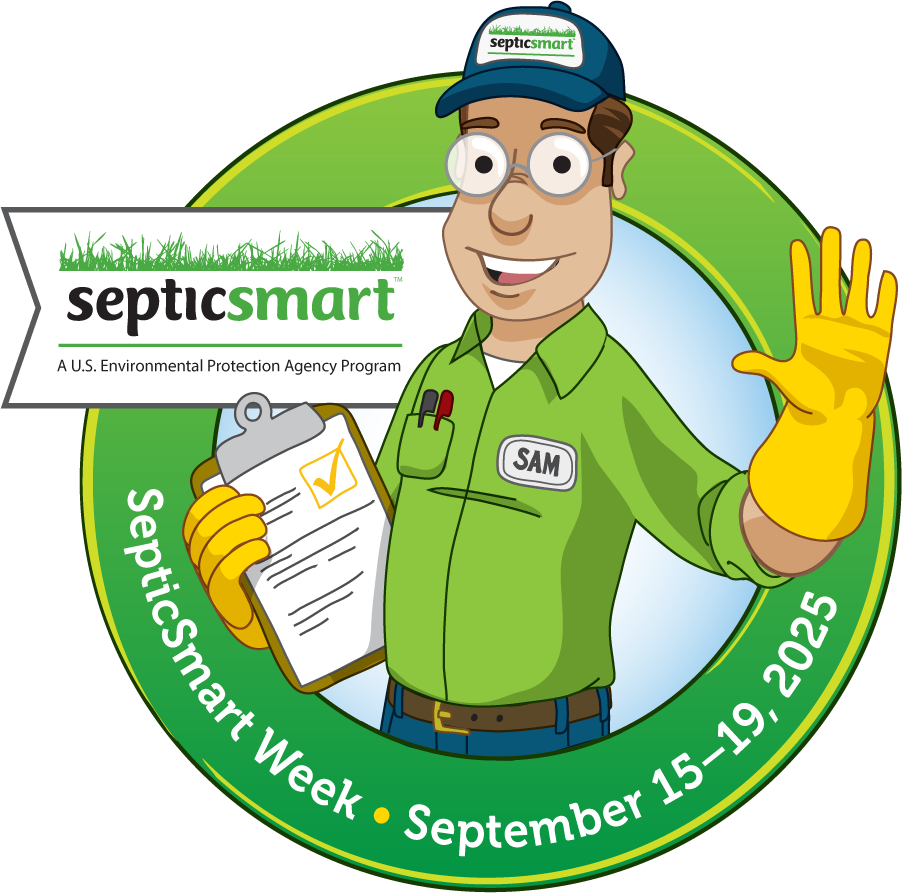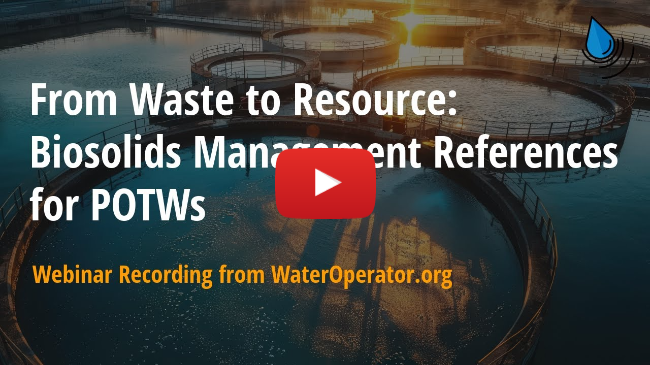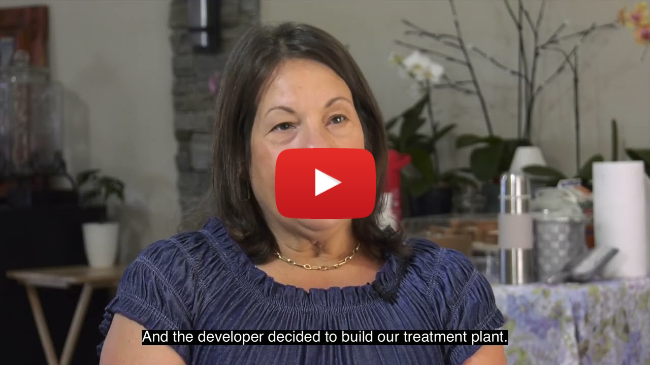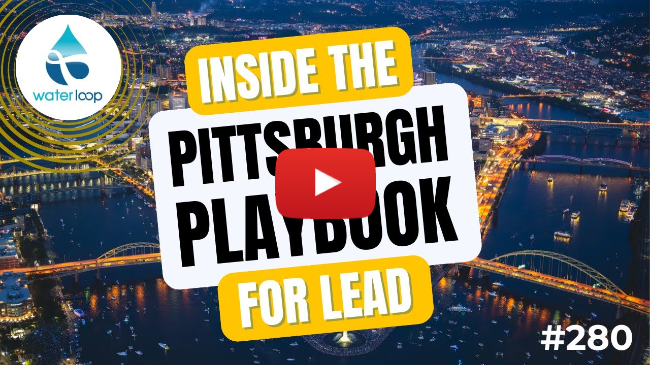|
Newsletter #413 for September 3, 2025 |
|
|
|
|
 |
Get Ready for the 13th Annual SepticSmart Week! |
|
What are you planning to do for this year's SepticSmart Week? This is the perfect time for communities, national organizations, local groups, and governments to come together and bring attention to the importance of caring for and maintaining septic systems through homeowner education and public outreach.
Now is the time to start planning if you haven't already! You can peruse the SepticSmart Week page at the EPA at your own pace or check out these particular (free!) resources we recommend for reaching and educating homeowners:
We would also recommend everyone to encourage their local government leaders to sign an official SepticSmart Week Proclamation. You can find links to different proclamation templates for governors, mayors, and tribal/community leaders at the EPA webpage!
If you're interested in learning more information about septic systems, check out our sister site, DecentralizedWastewater.org! Our blog is full of resources that focus on the importance of caring for and maintaining septic systems. Check out last year's blog post all about how to prepare for SepticSmart Week! |
|
|
|
|
 |
Missed our last webinar? Watch the recording! |
|
From Waste to Resource Biosolids Management References for POTWs
In this webinar, participants will discover some of the most helpful references to support wastewater treatment systems in biosolids management. Plus, learn how to use our search tools at WaterOperator.org to find additional resources and training events.
Topics will include: biosolids processing technologies/methods, starting a biosolids land application program, resource recovery from biosolids, and emerging contaminants in biosolids like PFAS and microplastics.
This continues our webinar series covering topics relevant to wastewater operators, including funding, asset management, compliance, and water quality.
For informational purposes only. We are unable to offer certificates for watching a video recording.
Recordings of our previous webinars:
|
|
|
|
|
Featured Video |
 |
The Story of Alborada, Puerto Rico | RCAP Environmental Finance Center (EFC) Narrative
Rural Community Assistance Partnership - RCAP
"The neighborhood community of Alborada, Puerto Rico consists of 168 residents. During 2007, there was a large growth in community members, which led to the houses being installed with onsite septic systems. Shortly after the installation, several residents started experiencing issues with wastewater backing up into their homes and yards, which caused some to have to leave their homes. It was determined that the soil in this area could not filter the wastewater.
The community has struggled for over 20 years of trying to resolve the issues with its wastewater system. Recently, it was determined that the best option would be to try and connect to a local Puerto Rico Aqueduct and Sewer Authority (PRASA) system, which is a government-owned corporation. This video shows how RCAP is helping them work towards regionalization to eliminate their wastewater issues." |
|
|
|
|
New Drop of Knowledge Articles |
|
Drop of Knowledge (DOK) is a monthly digital article that focuses on "practical insights related to infrastructure, capacity building and economic development in rural America." DOK provides technical tips and tricks of the trade from some of Rural Community Assistance Partnership's (RCAP) 200+ technical assistance providers.
This article highlights how the Arenas Valley Water Development Association (AVWDA) in rural New Mexico is working to secure its water future through a comprehensive revenue and rate analysis conducted with the help of the Rural Community Assistance Corporation (RCAC). Facing challenges like aging infrastructure, rising water costs, and limited control over purchased water rates, AVWDA is planning $6 million in improvements to reduce water loss and improve system efficiency. These efforts aim to ensure financial sustainability and potentially integrate into a larger regional waterline system, which would contribute to long-term water security for the community.
This article discusses the importance of income surveys in helping small and rural communities access funding for infrastructure and public health projects. It explains how RCAP uses these surveys to gather accurate data, like Median Household Income, which is often more representative than census data. This data is crucial for determining eligibility for grants and subsidies, assessing affordability through tools like the affordability index, and ensuring fairness in utility rate setting. RCAP empowers communities by providing trusted third-party surveys and technical assistance. These valuable services build financial capacity and resilience which helps to bridge the gap between project needs and available funding.
Browse more Drop of Knowledge articles on RCAP's website. |
|
|
|
|
Featured Video |
 |
How Pittsburgh Is CRUSHING Toxic Lead
waterloop
"Pittsburgh is writing a playbook on lead pipe replacement, aiming to eliminate all toxic lines by 2027.
In this episode, Will Pickering, CEO of Pittsburgh Water, and Michelle Naccarati-Chapkis of Women for a Healthy Environment reveal the strategy behind this national model.
With over $200 million in federal grants and low-interest loans, the city has replaced 13,000 lead service lines at no cost to residents. Digitized records and GIS mapping pinpoint pipes for efficient, low-disruption replacements using copper threading.
Community trust, rebuilt through transparent outreach and a Lead Response Advisory Committee, drives participation. Naccarati-Chapkis’s workshops target vulnerable neighborhoods, prioritizing kids and low-income areas.
This blend of tech, funding, and engagement offers a roadmap for clean water nationwide.
This episode was supported by Blue Conduit, the Environmental Defense Fund, and the Environmental Policy Innovation Center."
|
|
|
|
|
|
|
|
Everyone is Essential: Enhancing the Leadership and Management Skills of Water Utility Administrative Professionals
September 10, 2025 | 12:00 PM EDT
U.S. Environmental Protection Agency
This free webinar will focus on an innovative initiative led by the Rural Community Assistance Partnership (RCAP) in partnership with Water Finance Assistance and others, to provide much needed leadership and management training and a certificate to water and wastewater utility administrative professionals. This certification program will provide administrative professionals with a set of skills to better prepare them to make informed decisions, effectively manage resources and add more value to their utility. |
|
|
|
Green Infrastructure for Small Systems: Exploring Real World Examples
September 18, 2025 | 1:00 PM EDT
Environmental Finance Center Network
This free webinar will explore how green infrastructure (GI) is often seen as a “nice to have” bonus part of a project or as a strategy to manage stormwater that is only available to larger, urban utilities. But a growing number of smaller more rural communities are busting this myth. These communities are successfully integrating green infrastructure into their projects to improve quality, reduce localized flooding, and achieve ecological benefits. |
|
|
|
Wastewater Collection System Maintenance and Condition Assessment
September 25, 2025 | 1:00 PM EDT
Environmental Finance Center Network
This free, 1-hour webinar covers maintenance and condition assessment strategies that operators can apply to keep their collection system operating properly. |
|
|
|
|
|
|
|
|
|
|
Recent Blog Posts at WaterOperator.org |
|
|
 |
|
Paving the Way for Sustainable Drinking Water Supply in Arizona
Read Here » |
|
|
 |
|
Learning About Safety in Wastewater Treatment Plants
Read Here » |
|
 |
|
RCAP's Drop of Knowledge: Article Roundup #7
Read Here » |
|
|
|
|
|
Groundwater & Well Care for Public Water Systems is a free online course from WaterOperator.org. Certificates are provided and the course is currently pre-approved for 2 hours continuing education credit in a number of states.
Click here to learn more. |
|
|
|
|
|
|
|
|
|
WaterOperator.org is a free service, grant-funded to support small community water and wastewater operators with comprehensive resources and information in one easy-to-use place. We also serve the 800+ training, primacy, and technical service organizations, by helping operators get to their information. We aren't selling or advertising anything. Call us at 1-866-522-2681 for assistance. |
|
|
|
|
|
Visit our other websites: |
|
|
|
|
|
|
|
Click here to unsubscribe | Sent to: _t.e.s.t_@example.com
Illinois State Water Survey, 2204 Griffith Drive, Champaign, IL 61820, United States |
|
|
|
|